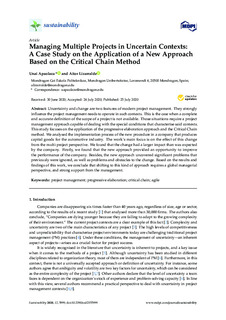| dc.rights.license | Attribution 4.0 International | * |
| dc.contributor.author | Apaolaza, Unai | |
| dc.contributor.author | Lizarralde, Aitor | |
| dc.date.accessioned | 2020-09-03T09:30:07Z | |
| dc.date.available | 2020-09-03T09:30:07Z | |
| dc.date.issued | 2020 | |
| dc.identifier.issn | 2071-1050 | en |
| dc.identifier.other | https://katalogoa.mondragon.edu/janium-bin/janium_login_opac.pl?find&ficha_no=159574 | en |
| dc.identifier.uri | https://hdl.handle.net/20.500.11984/1811 | |
| dc.description.abstract | Uncertainty and change are two features of modern project management. They strongly influence the project management needs to operate in such contexts. This is the case when a complete and accurate definition of the scope of a project is not available. Those situations require a project
management approach capable of dealing with the special conditions that characterise said contexts. This study focuses on the application of the progressive elaboration approach and the Critical Chain method. We analysed the implementation process of the new procedure in a company that produces capital goods for the automotive industry. The work’s main focus is on the e ect of this change from the multi-project perspective. We found that the change had a larger impact than was expected by the company. Firstly, we found that the new approach provided an opportunity to improve the performance of the company. Besides, the new approach uncovered significant problems that previously were ignored, as well as problems and obstacles to the change. Based on the results and findings of this work, we conclude that shifting to this kind of approach requires a global managerial perspective, and strong support from the management. | en |
| dc.language.iso | eng | en |
| dc.publisher | MDPI AG | en |
| dc.rights | © 2020 by the authors. Licensee MDPI, Basel, Switzerland | en |
| dc.rights.uri | http://creativecommons.org/licenses/by/4.0/ | * |
| dc.subject | project management | en |
| dc.subject | progressive elaboration | en |
| dc.subject | critical chain | en |
| dc.subject | agile | en |
| dc.title | Managing Multiple Projects in Uncertain Contexts: A Case Study on the Application of a New Approach Based on the Critical Chain Method | en |
| dcterms.accessRights | http://purl.org/coar/access_right/c_abf2 | en |
| dcterms.source | Sustainability | en |
| local.contributor.group | Dirección de operaciones logístico productivas | es |
| local.description.peerreviewed | true | en |
| local.identifier.doi | https://doi.org/10.3390/su12155999 | en |
| local.rights.publicationfee | APC | en |
| local.rights.publicationfeeamount | 837 EUR | en |
| local.source.details | Vol. 12. N. 15. N. art. 5999, 2020 | en |
| oaire.format.mimetype | application/pdf | |
| oaire.file | $DSPACE\assetstore | |
| oaire.resourceType | http://purl.org/coar/resource_type/c_6501 | en |
| oaire.version | http://purl.org/coar/version/c_970fb48d4fbd8a85 | en |








